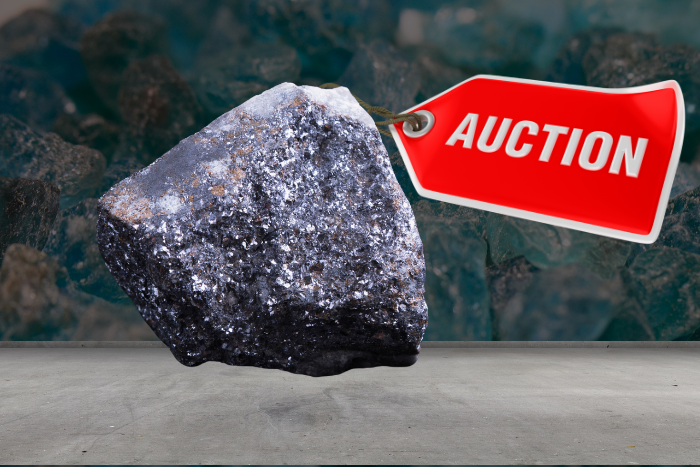Most of the first tranche of auction of seven critical mineral blocks had no takers. A second round is underway. These blocks will again be put up for the auctions in the fourth tranche after elections. Some rules have been tweaked, including putting in place clearances that were missing earlier and were proving to be a hindrance to the auction process, Hindu Businessline reported. The lithium block in Jammu and Kashmir got less than three bids, which led to them being put up for auction in the third tranche. The third tranche bidding ends in May and covers six other critical mineral blocks namely glauconite, graphite, nickel, platinum group of element (PGE), potash and titanium, apart from lithium. These blocks are located in the states of Bihar, Jharkhand, Tamil Nadu, UP and J&K.
The Centre initiated the auction of 38 critical & strategic minerals to date. The initial tranche included 20 blocks, while the subsequent tranche consisted of 18 blocks.
India in undersea race to mine world’s battery metal, applies for 2 more licenses
The 29th session of International Seabed Authority (ISA) meeting took place in Jamaica, where governments gathered to decide the future of deep sea mining, amid growing public resistance, Campaigners said deep sea mining companies are pressing governments to agree on a mining code that would legitimise this destructive practice. India, which already has two deep-sea exploration licenses in the Indian Ocean, has applied for two more amid increasing competition between major global powers to secure critical minerals, reported BBC.
China, Russia and India seek to mine cobalt, nickel, copper, manganese, thousands of metres below the surface of oceans, to produce renewable energy such as solar and wind power, electric vehicles and battery technology needed to battle against climate change. The UN-affiliated International Seabed Authority (ISA) has issued 31 exploration licences so far, of which 30 are active. Its member countries are meeting in Jamaica this week to discuss regulations around giving out mining licences. If the ISA approves India’s new applications, its licence count will be equal to that of Russia and one less than China.
Around two dozen countries—including the UK, Germany, Brazil and Canada—are also demanding either a halt or a temporary pause on deep-sea mining, given what they say is a lack of information about the marine ecosystems in those depths.
COP28 President unveils shared vision of COP Presidencies Troika at Copenhagen Climate Ministerial
The Copenhagen Climate Ministerial took place last month where COP28 president Sultan bin Ahmed Al Jaber released a shared vision of a first-of-its-kind COP Presidencies Troika. The Troika said the next round of Nationally Determined Contributions (NDCs) should be in line with keeping 1.5°C within reach. The Troika was agreed in the historic UAE Consensus and aims to enhance continuity between COP28, COP29 and COP30 and drive implementation of the UAE Consensus.
“Parties must do the work now to ensure that their NDCs meet the urgency of the moment—and are submitted at least nine months before COP30,” Jaber said adding that NDCs should cover all greenhouse gases—including methane. He also said the countries should put policies in place to deliver emission reductions of 60% compared to 2019 levels, before 2035. Jaber called for attendees to “follow the science” and ensure energy transition pathways are “just, orderly and responsible”.
UN’s climate body faces “severe financial challenges” which put work at risk
UNFCCC chief Simon Stiell made an urgent plea for government donations to bridge the UN body’s funding gap. The UNFCCC is facing “severe financial challenges” as the ability to fulfil its expanding workload is being put at risk by governments’ failure to provide enough money.
Stiell made an urgent plea for more funding to over 40 ministers and negotiators gathered on Thursday in Helsingør, Denmark, for the first major climate summit of the year. “We are attempting to meet an ever-growing mandate. Our job is to make your job easier. To carry out the tasks you have all agreed we should do, but we can only do this if we have the funding support.” Stiell said the organisation’s budget “is currently less than half funded”.
EU nature restoration laws face collapse, member states withdraw support
The EU’s nature restoration laws, which were due to be rubber-stamped in a vote by member states, now “appear on the verge of collapse”, The Guardian reported. The laws “have been two years in the making and are designed to reverse decades of damage to wildlife on land and in waterways”. However, the vote was shelved after it “became apparent the legislation would not pass its final stage with the majority required”. The European environment commissioner warned that shelving the bill indefinitely would destroy the EU’s reputation globally given it had led the way at the COP15 biodiversity summit in Montreal in 2022.
The news portal said the setback is the biggest blow to the EU’s environmental agenda in recent months, as policymakers decide how to respond to farmers’ protests across the bloc. As the demonstrations continue—in advance of the June [European Parliament] elections—many green rules have been weakened.”
About The Author
You may also like
India’s Budget 2024-25 focuses on capacity building to fight climate change, but lacks details
Study finds that extreme weather events do not draw political attention
India’s EV revolution: Are e-rickshaws leading the charge or stalling it?
Hope for 1 lakh trees: Karnataka refuses to handover Sandur forest for mining
Stalemate over new amount: Bonn talks hit climate finance roadblock ahead of Baku summit


